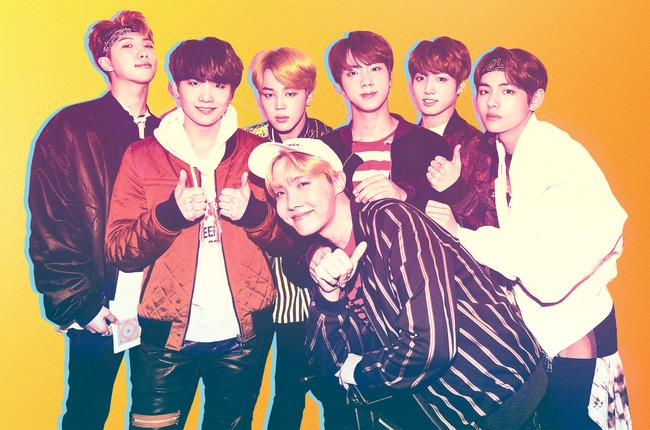On April 2, BTS played the fifth and final date of a sold-out U.S. arena run, performing to the shrieking fans who helped the group's second full-length album, Wings, become the first K-pop project to crack the top 40 of the Billboard 200 in 2016. Since debuting in 2013, the seven-piece boy band has become a commercial behemoth in its native South Korea while continuing to make inroads within American pop culture. "Change," an English-language hip-hop collaboration between BTS member Rap Monster and U.S. star Wale, was released three days before the kickoff of the stateside run.
"Change" touches on topics like voting rights and online harassment, while some of BTS' biggest hits have addressed mental health. "Worldwide, our young generation shares the same issues socially and politically," says BTS member Suga. Although K-pop music generally steers away from controversy, Rap Monster says that remaining outspoken "is important to us. And the bigger the voice we get, the more powerful our words become."
STARLIGHTPR: 4 Weeks Premium Next Level Campaign.The Source Magazine, Hip Hop Weekly, Live radio interviews and more.
A new BTS album is already underway and more U.S. dates might be on the way later this year. Bang Si Hyuk, the CEO and Executive Producer of label/management agency BigHit Entertainment who is better known as "Hitman" Bang, hints at "special features" designed for international listeners but thinks BTS will continue playing to its base.
"I'm not a believer in releasing full English songs to the U.S. market, like many K-pop artists have," Bang tells Billboard in his first-ever interview with American press. "We must focus on what we do best as K-pop artists and producers and maybe add some special features to which international or U.S. music fans can feel attached. That is the best way for me to put K-pop into the mainstream U.S. music market and, in that regard, BTS will participate and perform in a way that is not much different from what they have been doing in the last three years. We're adjusting and improving the way we do shows on the tour to meet the international or global level and expectations so that anyone, regardless of their culture and background, can enjoy BTS music and performances."
Bang is sure to add that the group will be "very active and responsive in releasing new songs that would come out of collaborations with international artists, like 'Change.'" And, looking ahead, both the CEO and band see their most recent accomplishments as inspiration to achieve even more in the future.
"I'm so excited and thrilled at the response to the U.S. tour," Bang says. "It's still overwhelming and unbelievable at some point. I even further feel responsible for producing better music and production for fans around the world and I'd definitely think harder on what makes fans enthusiastic and passionate about BTS music and the band." Meanwhile, the ambition within the group is perhaps best felt when member V winks that the group has "grander goals"; as if arena shows are just the beginning of what he and his band mates plan to accomplish around the world.
Below read on for an extended interview with BTS held before the tour kicked off. All member answers are taken via a translator except for Rap Monster.
With five arena shows, this tour is so huge and I think the main reason for that and why you guys are doing so well in America is because you sing about personal topics. Why is that so important to talk about in your music?
Suga: Worldwide, our young generation shares the same issues socially and politically. I think that young people feel the same way about similar issues and BTS wants to cheer them up with our songs and talk about our feelings and social issues.
Rap Monster: These topics, like you said, they're important, right? They should be told by someone. Someone should talk about it. And if someone should talk about it, then it feels like we have to talk about it. It's very much an honor that we get power and attention from our fans them when we use our voices more. It's important to us and the bigger the voice that we get, the more powerful that our words become.
These topics -- loneliness, mental health, bullying -- you don't hear about in K-pop or even Korean culture much. Or, really, in American pop music either. Have you ever worried it might get a negative or opposite response?
Suga: There are people who think negatively and there have been people who react negatively towards BTS' music. But I think it's way more important to make music with those issues because I think it's important to encourage people to fight for those issues and, through the music, have a resolution for those issues. But I'm going to continue to talk about those issues through the music anyway. [Laughs]
Do you think K-pop needs to get more personal to gain a wider audience? Would you like to see that more in future?
Rap Monster: We still need some party songs, we still need some light love songs. I love to listen to them and feel the vibe from that. Everyone has their luggage and their shadows, but it's up to everyone's own [devices]. But we're us. I think if we talk about it and if it gets more voice and attention, then maybe there are a lot of people in the world that accept us start to talk about those issues. I think that's the change.
I thought "Spring Day" was a really big musical moment for you guys. Not only did it do really well on the charts, but this time you were showing a progression in thinking and a message of hope. The idea of recovering and winter moving to spring. Was that a conscious decision?
Rap Monster: It's just like what you said, that was one step further. We're always talking about the crises, the sorrows and youth's feelings of getting lost. In many [television] programs, when we'd introduce our new album, I'd always talk about the word "recovery." Like you said, it's all about the recovery. Winter going to spring. The middle of the winter going to the spring. You got that.
Suga: In addition to being what we are as BTS, we wanted to bring some changes and we actually wanted to evolve as a group. We wanted to show our many colors, but we still want to console others and give hope to others.
Something that was unique was all the solo songs on the Wings album. You've done mixtapes, but instead of full-fledged solo or unit releases, you got to show your different sides of yourselves. Why was that necessary?
Jin: The solo tracks were important because it was personal, an individual story and it was represented in the way that we are good at it. We worked a lot on each track and that's why it was important to each of us.
Rap Monster: When I get questions about why is K-pop is so popular; I always tell them K-pop is like a great mix of music, videos, visuals, choreography, social media and real-life contents. Making the solo tracks on the album was quite a venture, but it's connected to the concept. Like, when you watch the "I Need U" video, everyone has their own crises and characters. It's kind of connected to our real personalities and characters, but the solo songs have their own characters and personalities. It's all connected. It's a mixture and that's why people get interested in the concepts.
Speaking of solo songs, "Change" recently came out. Rap Monster, you and Wale are talking about different-but-similar issues when South Korea and America are both having interesting political times. Did you guys have a chance to discuss your different viewpoints?
Rap Monster: We didn't have the time to get into it deeply, but I'm always watching the news about Trump and America; I always watch. When he first suggested a collaboration, I was like, "What should we do?" We could just do you know, a common hip-hop song, but I wanted to do a little more special. We have our political situation in Korea and the students are very angry. So, I think, if we talked about what's going on, then we'll have a real special collaboration. I think my guess was right and it became special.
Do you see or feel your influence among other groups in the industry?
Jungkook: When we debuted back in 2013, we were influenced by our sunbaenim [Korean word for "senior"]. Over the years, as we watched other younger groups, we know they talk about us, they cover us and they follow us. I think they're saying in interviews that they learned a lot from us and that makes us feel great. Being a sunbaenim, we want to be a good influence and be a better role model to other groups.
Last question, are you happy?
V: For now, we are very happy as we are, as a group, together. And I think we are happy because we are walking on the same path, walking the same direction. We wanted to get Daesang [Best of the Year award], but we have it already so our goal is to make great music, to share it with our fans.
Rap Monster: And a worldwide, stadium tour. That's the goal.
V: We have grander goals.








